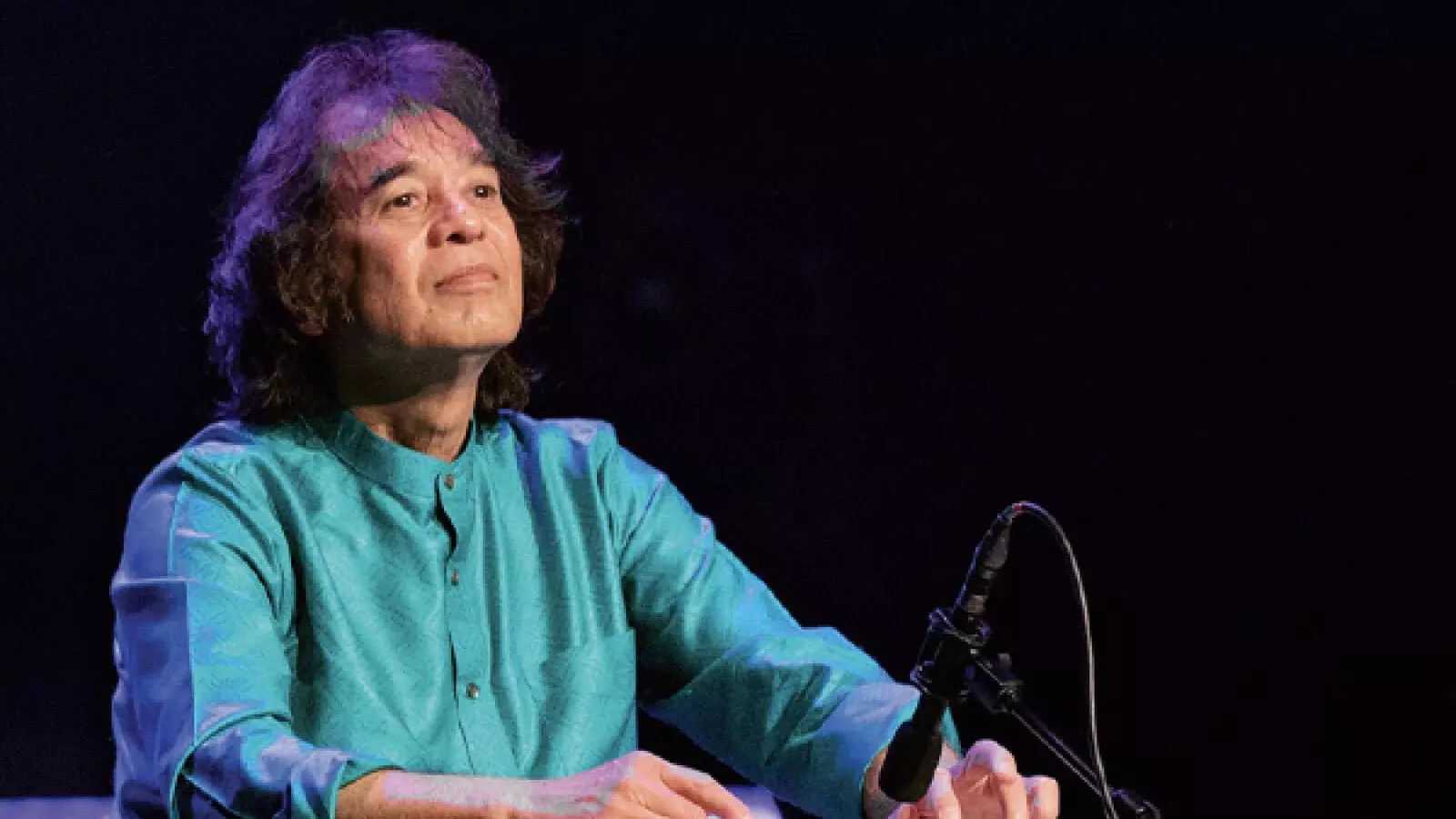Tabla Maestro Ustad Zakir Hussain Dies at 73 from Pulmonary Fibrosis, Family Confirms
One of the most prominent global ambassadors of Indian classical music, the maestro elevated the humble tabla into a powerful symbol of universal peace and unity.
Zakir Hussain

The tabla fell silent on December 16, 2024, as Ustad Zakir Hussain (1951-2024), one of the most renowned global ambassadors of Indian classical music, passed away after a brief illness in San Francisco, California. A virtuoso who redefined the role of the tabla, Hussain transformed the modest percussion instrument into a powerful symbol of universal peace and humanity. His breathtaking speed, dexterity, and creativity captivated audiences worldwide, transcending cultural boundaries.
Born into a family steeped in musical tradition, Hussain’s art resonated with the syncretic spirit of India. Raised in an environment where his father, the legendary Ustad Alla Rakha, believed every instrument has its soul, Hussain grew up singing hymns to Mother Saraswati, verses from the Quran, and Bible hymns—a reflection of India’s rich spiritual and cultural diversity. From a young age, Hussain forged a unique musical voice, weaving stories with percussive sound that sparkled with spontaneity and natural flow. His music embodied both the complexity of classical traditions and the ease of fusion, impressing purists and attracting those drawn to the global appeal of Bollywood and fusion genres alike. In February 2024, at the peak of his artistic genius, Hussain won three Grammy Awards in a single night, a testament to his unparalleled contributions to music.
Hussain’s tabla was much more than a rhythmic instrument; he showed the world it could also be a melodic one. He seamlessly blended intricate rhythms and complex patterns with dynamic nuances, from mimicking the sounds of traffic signals to recreating the gentle walk of a deer. Throughout his career, he explored a wide range of musical possibilities, using technology to experiment with frequencies and highlight the tabla’s subtle shades. Alongside prominent tabla artists like Anindo Chatterjee, Shafaat Ahmed Khan, Kumar Bose, and Swapan Chaudhuri, Hussain’s role in popularising the tabla and establishing its place on the global stage remains unmatched.
Born in Mumbai to Ustad Alla Rakha, a disciple of the great Pandit Ravi Shankar, Hussain was introduced to tabla at the tender age of three. By his teenage years, the tabla had become not only his instrument but also an extension of his personality. His musical journey was guided by his father, who encouraged him to explore new avenues while staying rooted in Indian classical tradition. Hussain’s formative years were a blend of diverse musical influences—devotional hymns, Quranic verses, and prayers—shaping his unique artistic voice. By the age of 19, he had already started teaching at the University of Washington before moving to San Francisco, where he met his future wife, Antonia Minnecola.
A chance encounter in New York with iconic guitarist John McLaughlin marked the beginning of an enduring collaboration that gave birth to the groundbreaking fusion group Shakti in 1973. Alongside violinist L. Shankar and percussionist T. H. Vinayakram, Hussain blended Hindustani and Carnatic classical music with jazz, creating a genre-defying sound that continues to inspire musicians worldwide. In 2024, Shakti won a Grammy for Best Global Music, a recognition of the band's enduring influence.
Hussain’s passion for experimentation led to collaborations with an eclectic mix of artists, from Irish singer Van Morrison and American percussionist Mickey Hart to Latin jazz legend Giovanni Hidalgo and Grateful Dead's Jerry Garcia. He also embraced the electronic music wave of the 1990s while preserving the tabla’s acoustic purity. His collaborations with Indian classical luminaries such as Santoor maestro Pandit Shiv Kumar Sharma, flautist Hari Prasad Chaurasia, and sarangi virtuoso Ustad Sultan Khan resulted in magical jugalbandis that blended melody and rhythm into deep, meditative exchanges. In recent years, he composed the Triple Concerto for Tabla, Sitar, and Flute, bringing together the talents of Niladri Kumar and Rakesh Chaurasia. His collaboration with Carnatic musicians, including violinist Kala Ramnath and veena virtuoso Jayanthi Kumaresh, further enriched his fusion experiments.
For Hussain, fusion was not a novelty but a natural evolution. He was inspired by the legacy of Amir Khusrau, who blended Dhrupad and Sufi traditions and grew up witnessing his father’s involvement in Hindi film music that incorporated diverse musical influences. Hussain’s own foray into cinema included playing the tabla for the iconic music of Parasmani and composing scores for films like Mr and Mrs Iyer, Muhafiz, and Parzania. His tabla also contributed to the soundtracks of international films such as Apocalypse Now and Monkey Man.
Hussain’s star power extended beyond music; his charismatic presence and passion for classical music made him a household name. Perhaps most memorably, he became the face of a popular tea brand in a commercial shot at the Taj Mahal, where his tabla-playing brought the magic of classical music into millions of homes. His infectious energy, captured in the ad with his curly locks flying and fingers racing across the tabla, became iconic.
Despite global fame, Hussain remained humble, with his curiosity about music never waning. In his own words, "I haven’t played good enough to quit." His death marks the end of an era, but his legacy as a virtuoso, a fusion pioneer, and a global ambassador of Indian music will resonate for generations to come.

